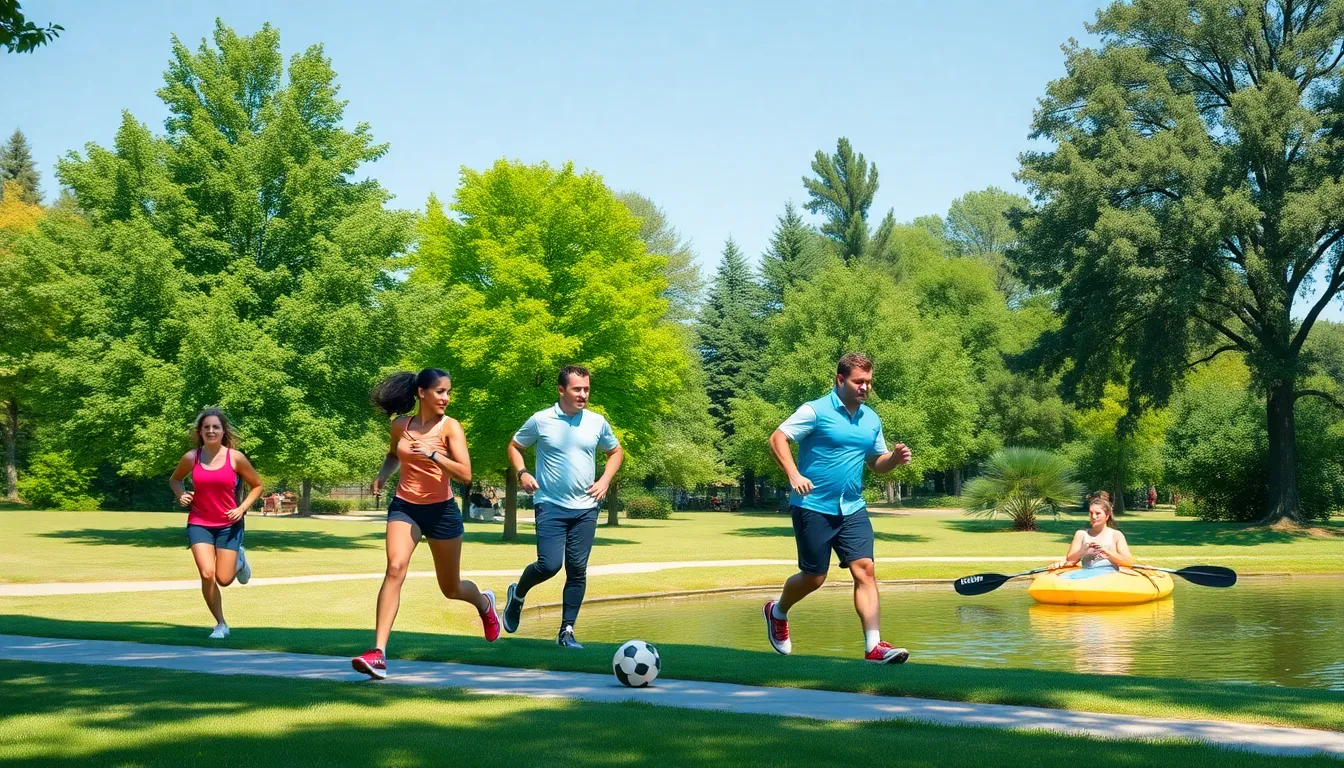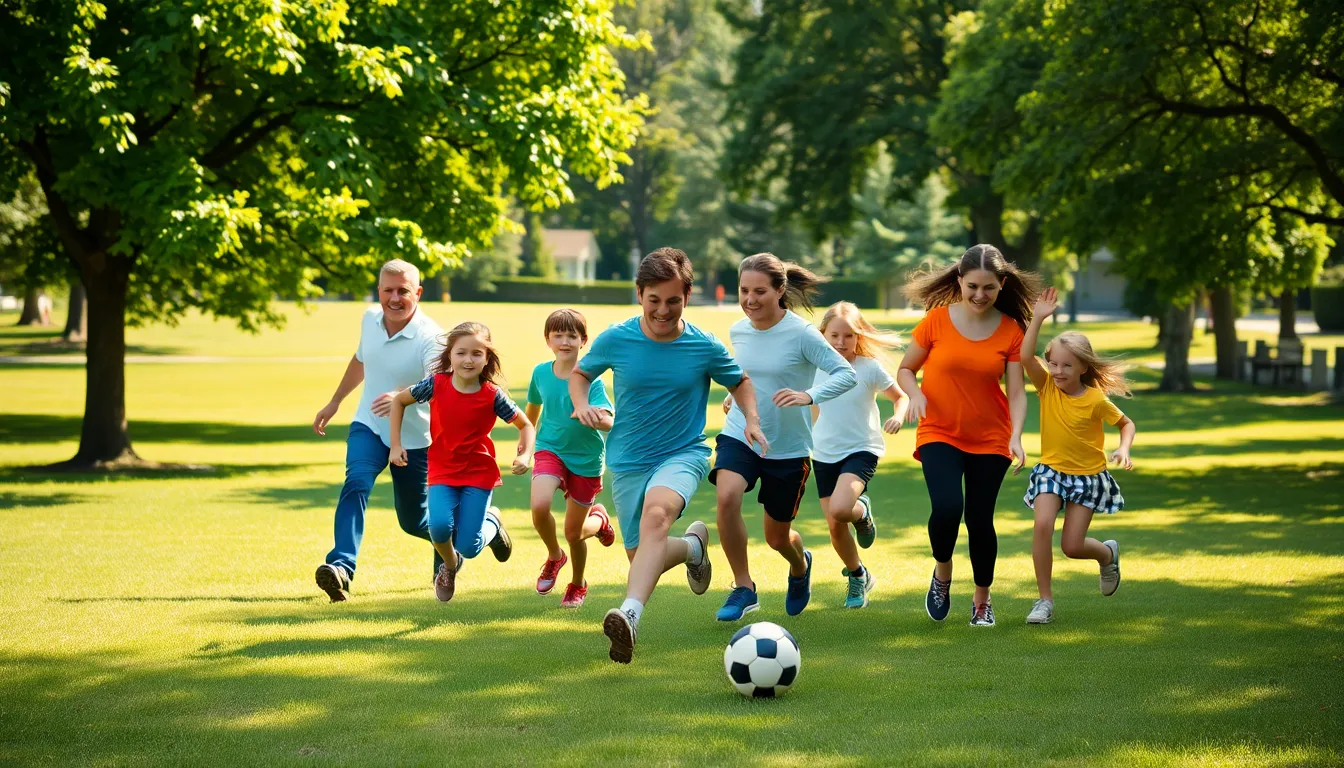Table of Contents
ToggleRecreational sports activities offer a fantastic way to unwind, socialize, and stay fit. Whether it’s a casual game of soccer in the park or a friendly match of tennis, these activities provide an excellent outlet for people of all ages and skill levels. They foster a sense of community and encourage a healthy lifestyle, making them essential for both physical and mental well-being.
As more individuals seek balance in their busy lives, recreational sports serve as a perfect solution. They not only promote physical fitness but also enhance social connections and boost mood. From team sports to individual pursuits, there’s something for everyone, making it easy to find an activity that suits personal interests and fitness goals. Exploring the world of recreational sports can lead to new friendships and unforgettable experiences.
Overview of Recreational Sports Activities
Recreational sports activities encompass a wide range of physical pursuits designed for enjoyment and fitness. These activities can be categorized into team sports, individual sports, and adventure sports, appealing to diverse interests and abilities.
Team Sports
Team sports promote collaboration and camaraderie among participants. Common examples include:
- Soccer: Played by two teams of eleven players, soccer emphasizes teamwork and strategy.
- Basketball: Involves two teams of five players, focusing on scoring points by shooting a ball through the opponent’s hoop.
- Volleyball: Teams of six players score points by hitting a ball over a net, showcasing communication and coordination.
Individual Sports
Individual sports cater to those who prefer solo pursuits. Notable examples include:
- Running: This aerobic activity benefits cardiovascular health and can be competitive through races or marathons.
- Swimming: Often a low-impact exercise, swimming builds endurance and strengthens muscles while providing a refreshing environment.
- Tennis: This racquet sport hones agility and coordination, allowing players to engage in singles or doubles matches.
Adventure Sports
Adventure sports appeal to thrill-seekers and include:
- Rock Climbing: Participants scale natural rock formations or indoor walls, fostering physical strength and problem-solving skills.
- Mountain Biking: This sport combines cycling with off-road trails, requiring balance and stamina.
- Kayaking: Paddlers navigate rivers or lakes, enhancing upper body strength while enjoying nature.
Benefits of Participation
Engaging in recreational sports activities offers various advantages, such as improved physical fitness, enhanced social interactions, and increased mental well-being. Physical engagement promotes overall health. Social connections emerge through shared experiences, fostering community bonds. Mental health benefits include stress relief and improved mood.
Recreational sports activities provide individuals with an effective means of achieving a balanced lifestyle. The inclusivity of these activities ensures that everyone, regardless of age or skill level, can partake and enjoy the numerous rewards they offer.
Types of Recreational Sports Activities

Recreational sports activities can be classified into various categories, each offering unique benefits and experiences. The main types include individual sports, team sports, and water sports.
Individual Sports
Individual sports cater to those who prefer engaging in activities alone while fostering personal growth. Examples include:
- Running: Enhances cardiovascular health and endurance.
- Swimming: Offers full-body workouts and low-impact resistance.
- Tennis: Improves agility, coordination, and focus.
- Cycling: Strengthens leg muscles and promotes cardiovascular fitness.
Engaging in individual sports allows participants to set personal goals, enabling self-discipline and motivation while enhancing mental health.
Team Sports
Team sports emphasize collaboration, communication, and strategy. Popular examples encompass:
- Soccer: Encourages teamwork and improves cardiovascular fitness.
- Basketball: Boosts agility and builds endurance through fast-paced play.
- Volleyball: Enhances coordination and fosters teamwork dynamics.
- Baseball: Supports strategic thinking and develops hand-eye coordination.
Participating in team sports creates strong social bonds and enhances overall fitness levels, making them ideal for fostering community engagement.
Water Sports
Water sports provide enjoyable ways to stay active while enjoying the outdoors. Notable examples include:
- Kayaking: Engages core muscles while enhancing upper body strength.
- Surfing: Combines skill and balance, providing a full-body workout.
- Stand-Up Paddleboarding: Improves stability and overall body tone.
- Snorkeling: Encourages exploration and promotes fitness through swimming.
Engagement in water sports not only improves physical health but also offers serenity and relaxation brought on by being in or near water.
Benefits of Recreational Sports Activities
Recreational sports activities offer numerous benefits, enhancing physical health, mental well-being, and social connections. Engaging in these activities promotes a balanced and fulfilling lifestyle.
Physical Health Benefits
Recreational sports significantly improve overall physical health. Participation boosts cardiovascular fitness, enhances muscle strength, and fosters flexibility. For example, activities like running and swimming increase heart health and lung capacity, while sports such as soccer and basketball develop coordination and endurance. Engaging in outdoor activities, like hiking and cycling, aids in weight management and reduces the risk of chronic diseases including obesity, diabetes, and hypertension. Regular participation in these sports encourages an active lifestyle and contributes to long-term health.
Mental Health Benefits
Mental health benefits from recreational sports include reduced stress, improved mood, and enhanced cognitive function. Physical activity triggers the release of endorphins, creating feelings of happiness and relaxation. Sports provide opportunities for social interaction, combating feelings of isolation and loneliness. Participating in recreational activities also fosters resilience and boosts self-esteem through achievement and skill development. For instance, mastering a new sport can significantly enhance personal confidence and promote a positive mindset. Engaging in these activities leads to holistic mental wellness, making them essential for a balanced life.
Choosing the Right Recreational Sports Activity
Choosing the right recreational sports activity involves considering personal preferences, fitness goals, and social dynamics. Recognizing individual interests ensures enjoyable and rewarding experiences.
Factors to Consider
- Skill Level: Assessing current skills helps identify suitable activities, whether beginner-friendly or advanced.
- Physical Fitness: Evaluating fitness levels directs individuals towards activities that enhance health without causing strain.
- Social Environment: Choosing between team-based or individual pursuits affects social interaction opportunities and personal motivations.
- Location: Considering the availability of facilities, parks, or venues impacts accessibility and practicality of chosen sports.
- Time Commitment: Understanding the time commitment required for training or matches assists in balancing schedules with other responsibilities.
- Seasonality: Factoring in seasonal variations helps select activities that align with optimal weather conditions, ensuring enjoyment and safety.
Popular Activities for All Ages
- Soccer: This team sport encourages participation from children and adults alike, promoting teamwork and physical fitness.
- Swimming: Practiced individually or in groups, swimming benefits overall health while providing a low-impact workout for all age groups.
- Cycling: Ideal for families, cycling offers various routes suitable for different skill levels, enhancing cardiovascular health.
- Tennis: Engaging for all ages, tennis develops agility and coordination while fostering healthy competition.
- Yoga: Gaining popularity for its mental and physical benefits, yoga caters to various skill levels and promotes flexibility.
- Hiking: Accessible to all fitness levels, hiking provides opportunities for exploration and connection to nature while boosting physical health.
Choosing the right recreational sports activity ensures enjoyment and fosters personal growth, making it a vital aspect of a balanced lifestyle.
Safety Considerations in Recreational Sports Activities
Safety is paramount in recreational sports activities to prevent injuries and ensure enjoyable experiences. Participants must assess risks associated with each activity and take appropriate precautions.
Personal Protective Equipment
- Helmets: Essential for cycling, skating, and contact sports.
- Pads: Necessary for skateboarding and rollerblading to protect knees and elbows.
- Life jackets: Vital for water-based activities like kayaking and sailing.
Warm-Up and Cool Down
- Stretching: Improves flexibility and reduces the risk of muscle strains.
- Gradual escalation: Increases activity intensity to prepare the body for exertion.
- Post-activity stretches: Help prevent soreness and aid recovery.
Hydration and Nutrition
- Water intake: Crucial before, during, and after activities to maintain hydration levels.
- Balanced meals: Provide necessary energy to support athletic performance and recovery.
Environment and Equipment Checks
- Terrain assessment: Ensures safety by identifying potential hazards like uneven surfaces or obstacles.
- Equipment inspection: Regular checks prevent mechanical failures in bikes, kayaks, or sports gear.
Awareness of Surroundings
- Vigilance: Participants must stay alert to avoid collisions with others or objects.
- Rule adherence: Following the guidelines of specific sports ensures safety for everyone involved.
Medical Considerations
- Health evaluations: Important for individuals with pre-existing conditions to avoid complications.
- First aid: Access to first aid kits and knowledge of basic first aid techniques can mitigate injury risks.
Focusing on these safety considerations enhances enjoyment while minimizing dangers in recreational sports activities.
Recreational sports activities provide a valuable avenue for enhancing physical fitness and mental well-being. They foster social connections while allowing individuals to explore diverse interests. By participating in team sports, individual pursuits, or adventure activities, people can experience the joy of movement and the thrill of new challenges.
Prioritizing safety and personal preferences ensures a rewarding experience. With the right approach, recreational sports can seamlessly fit into busy lifestyles, offering moments of relaxation and fun. Ultimately, these activities not only contribute to a healthier lifestyle but also create lasting memories and friendships, enriching lives in countless ways.




